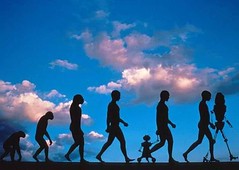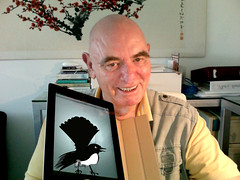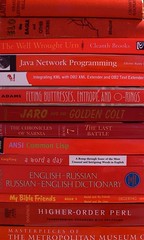- I've never really thought about the categories of books I've had before. I've collected books from many sources and over a long period of time so I've never really had a very clear personal "collection policy" so there's plenty of odd stuff in there. It's mostly graphic novels, reference books, philosophy stuff, science stuff, and of course kid's books but there are ones that stand out: "Sesshu's Long Scroll", a spiral bound copy of "Understanding Neural Networks", and a nicely bound copy of the Qu'ran. In the course of cataloguing some of these works, particularly when I'm tagging them with my basic subject areas of interest -- figuring out how broad or specific to make those tags or whether to use them at all if there's only going to be one or two with that tag anyway -- it really makes me think about subject headings and how they can and/or should be used. I initially just wanted to be able to see the numbers of certain books in a subject that I find interesting and retrieve them easily. But then I had to add non-subject tags like ".damaged" or ".gift". And then format tags, such as "REFERENCE" or "GRAPHIC NOVELS". I came across my copy of "Dark side of the moon : the making of the Pink Floyd masterpiece" and realized that, although I like music, I don't really have a lot of books on the subject. Should I get more? Is it worth my time? I have so many other interests. Going through my books subject-wise is like walking through a list of my interests, both proven by past actions and potential or maybe just hinted at.
- Dewey numbers are crap for fiction. Ok, everybody knows that but trying to put my books into some sort of order led to using Dewey numbers which led to the hard fact that Dewey doesn't do any kind of fiction justice, especially comic strip compilations and graphic novels. I had to invent a personal organization method to use instead, roughly based on the solutions I've seen in public library. For example, "FIC A Smi 1997" is a work of fiction, considered an "adult" novel (not sexual, just grown-up, to differentiate it from my YA books and juvenile books, or other formats), by someone with the last name starting with "Smi" published (or originally created) in the year 1997. It's mostly, as Dewey is supposed to do, to lump alike things together.
- It's a lot of work. Again, not a new discovery here but it's really hit home. And I'm not even truly cataloguing them. Just cleaning up a few key pieces of metadata. I was tidying up the publication statement and ensuring it had the right ISBNs but that starting taking too long and I didn't think it was really worth it. And besides, I think LibraryThing records include ISBNs that I can't easily see since I get records with a search for an ISBN that doesn't end up being the in field. Odd. Anyway, not really important, and not worrying about it made things go a little quicker.
- Finally, although you have to "judge a book by it's cover" it's better if you don't have to. Describing a book, or really anything, should be done with someone that has a good deal of knowledge about the work (or thing). Some key access points may not be immediately clear to someone who hasn't read the book. If you don't know the subject area, then how could you know the place this particular work has in it? Ideally, cataloguing should be done slowly by a few people who love the particular work, perhaps the particular author. Philosophy texts should be catalogued by philosphers, collections of poetry, by poets. How can I truly describe my book on neural networks? I know very little about cognitive science. But cataloguers don't and can't know the subject matter to that degree. The work is done by people who know classification and the rules of AACR2 and RDA. But when keying in even the tiny specks of metadata about my own collection, I find it much easier and much more rewarding to work with a book I have written a review of, like "Knitting the Semantic Web", or read a million times, like "Waiting for Godot". Sometimes it makes me think of the part of "Farhenheit 451" when the main character meets the "books", the people who have memorized entire novels and have saved them that way. Perhaps each book should have it's own cataloguer, who gets to know the work, inside and out, and therefore is the only one qualified to know how to describe it and give access to it. Not good for the people in those jobs though, I guess, right?
Oh, and one more thing. I've discovered that I'm really weird. I take great pleasure in considering the proper capitalization of my books. For example, in AACR2, the only title words that get capitalized are the first one and any proper nouns. I have the graphic novel "Star trek : countdown". Although it looks weird, "trek" doesn't get capitalized because, in the context of the title, it's not a proper noun. It's just a "trek" through the "stars". But I also have "Star Trek : The Next Generation : technical manual". In this case, "Trek" is capitalized because this is a technical manual for the ship in the TV show "Star Trek : The Next Generation". TV show names are proper nouns. (I mean, technically, the book should have been called something like "Technical manual for the USS Enterprise, NCC-1701D" or something like that, and not had a cool cover, but publishers like to think they're tricking us into buying their crap... which they are.) In the first case, the work is using the term as a name for the work and isn't referring to itself. It's just using the words as they are, as the entire "Star trek" universe does. The second case is using the term in reference to the series, to the previous works, to the fictional universe that the TV shows, movies, comics, etc. make up.
Of course, I'm only half way through my books so far so perhaps I'll learn more (or learn better?) as I go. And then there's my movies and video games... I need a "LibraryThing" for those.








